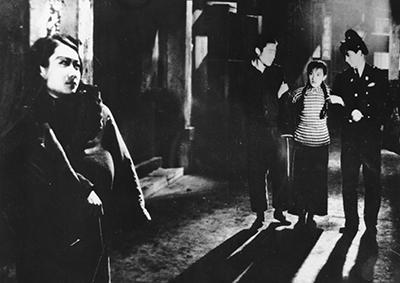Directed by Yuan Muzhi
Loosely based on director Frank Borzage's 1927 silent classic Seventh Heaven (though bearing the title of the film he made a year later) and a major hit upon its release in Shanghai, Street Angel is a curious mélange of leftist Chinese cinema motifs and Hollywood bravado, and plentiful other delightfully discordant elements. (The opening parade scene, featuring copious cross-cutting between bemused onlookers and the film's playful main characters, could be mistaken for early Fellini.) Zhao Dan stars as a misfit street musician who sets out to rescue two hard-luck sisters---one already sold into prostitution, the other on the verge of the same and barely subsisting as a teahouse singer---from their dire straits. A scintillating mixture of melodrama, social realism, exuberant musical numbers and slapstick comedy, Street Angel is considered the definitive portrait of Shanghai street life in the 1930s, marvelously capturing the earthy energy and wild collective mood swings that preceded the incipient Japanese invasion.
Mingxing Film Company. Screenwriter: Yuan Muzhi. Cinematographer: Wu Yinxian. Cast: Zhao Dan, Wang Jiting, Wei Heling, Zhou Xuan, Qian Qianli.
35mm, b/w, in Mandarin with English subtitles, 91 min.
Watch a scene from the film below.






 Mobile Navigation
Mobile Navigation

